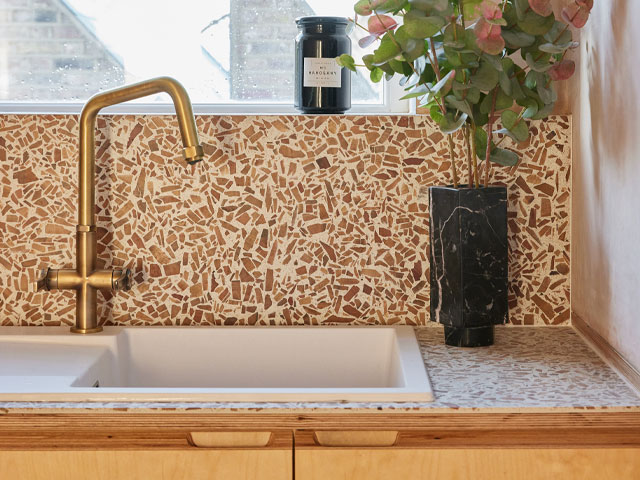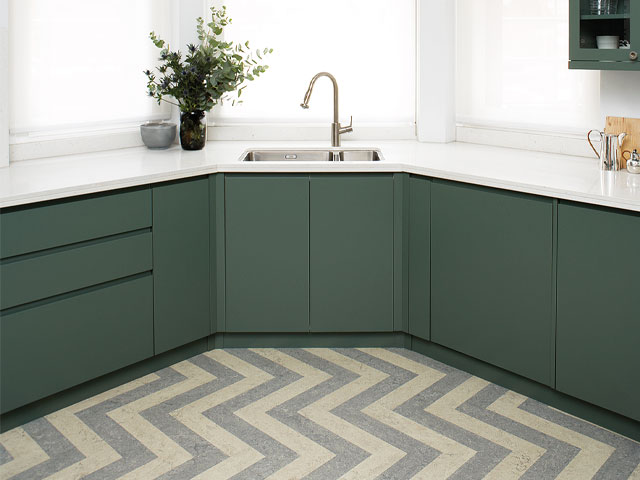
In an era where environmental concerns are at the forefront of our minds, eco-friendly choices have become a priority in every aspect of our lives. When it comes to home design, one area that holds immense potential for sustainability is the tiles. As a versatile and essential element in any home, tiles offer an opportunity to make a positive impact on the environment.
In this enlightening article, we explore the world of sustainable tiles that allow you to elevate your home while minimizing your carbon footprint. From innovative materials to ethical manufacturing practices, these eco-conscious tile options offer a perfect blend of style and environmental responsibility
What is Eco-Friendly Tile ?

Source: TerrazzoTile, Foresso / Rise Design Studio, granddesignsmagazine.com


Eco-friendly tiles, also known as sustainable or green tiles, are flooring or wall covering options that are designed to have a minimal impact on the environment throughout their lifecycle. These tiles are made from recycled or rapidly renewable materials, manufactured using eco-conscious practices, and aim to promote environmental conservation and responsible resource management. Key characteristics of eco-friendly tiles include:
- Recycled Materials: Eco-friendly tiles often incorporate recycled content, such as recycled glass, ceramic, or other post-consumer materials. By using recycled materials, these tiles help divert waste from landfills and reduce the need for new raw materials.
- Rapidly Renewable Resources: Some eco-friendly tiles are made from rapidly renewable resources like bamboo, cork, or linoleum. These materials replenish quickly, making them more sustainable alternatives to traditional resources that take longer to renew.
- Low VOC Emissions: Eco-friendly tiles typically have low volatile organic compound (VOC) emissions. VOCs are chemicals that can off-gas from certain materials and negatively impact indoor air quality. Low VOC tiles contribute to a healthier living environment by minimizing harmful emissions.
- Water Conservation: Some eco-friendly tiles are designed to conserve water during their production or use. Water-conserving tiles can help reduce water consumption and promote sustainable water management.
- Responsible Sourcing: For natural stone tiles, eco-friendly options often come from quarries that follow responsible and ethical sourcing practices. This ensures that environmental impact and social considerations are taken into account.
- Sustainable Manufacturing: Eco-friendly tiles are often produced using eco-conscious manufacturing practices that minimize energy consumption and waste generation. Sustainable manufacturing processes aim to reduce the overall environmental footprint of the tiles.
- Durability and Longevity: Sustainable tiles are typically durable and long-lasting, reducing the need for frequent replacements and minimizing waste over time.
- Green Certifications: Some eco-friendly tiles may carry green certifications, such as LEED (Leadership in Energy and Environmental Design), GreenGuard, which validate the tiles’ environmental performance and adherence to sustainability standards.
Benefit of Sustainable Tiles


- Reduced Environmental Impact: Sustainable tiles are often made from recycled or renewable materials, reducing the demand for new resources and minimizing waste. By choosing these tiles, homeowners contribute to reducing their carbon footprint and conserving natural resources.
- Energy Efficiency: Some sustainable tiles have energy-efficient properties, such as high thermal mass or reflective surfaces. These tiles can help regulate indoor temperatures and reduce the need for artificial heating or cooling, leading to energy savings.
- Improved Indoor Air Quality: Many sustainable tiles, especially those with low VOC emissions, contribute to better indoor air quality. Low VOC tiles emit fewer harmful chemicals, promoting a healthier living environment for occupants.
- Water Conservation: Some sustainable tiles are designed to conserve water, making them ideal for areas like bathrooms and kitchens. Water-saving tiles help reduce water consumption and support sustainable water management.
- Longevity and Durability: Sustainable tiles are often durable and long-lasting, reducing the need for frequent replacements. Investing in quality tiles can extend the lifespan of your flooring or walls, minimizing waste over time.
- Versatility in Design: Sustainable tiles come in various colors, sizes, and patterns, providing homeowners with a wide range of design options. Whether you prefer a contemporary or rustic look, sustainable tiles can meet your style preferences.
- Eco-Friendly Manufacturing: Many sustainable tile manufacturers prioritize eco-friendly production processes, recycling, and responsible waste management. Supporting such brands encourages more sustainable practices within the industry.
- Positive Contribution to LEED and Green Building Initiatives: Choosing sustainable tiles can contribute to LEED (Leadership in Energy and Environmental Design) and other green building certifications, making your home more environmentally friendly and energy-efficient.
- Responsibly Sourced Natural Stone: Sustainable natural stone tiles are sourced from quarries that adhere to responsible and ethical practices. This ensures the protection of the environment and the well-being of communities near the quarry sites.
- Support for Sustainable Practices: By opting for sustainable tiles, homeowners support businesses that prioritize environmentally conscious practices. This creates a demand for more eco-friendly products and contributes to the growth of sustainable industries.
- Aesthetic Appeal: Sustainable tiles are not only eco-friendly but also aesthetically pleasing. From rustic looks to contemporary designs, these tiles offer a wide range of options to suit different interior design styles.
Eco-Friendly Tile Options



- Recycled Glass Tiles: Made from recycled glass bottles and other discarded glass, these tiles reduce waste and conserve raw materials while adding a unique and elegant touch to any space.
- Reclaimed Wood Tiles: Tiles made from reclaimed wood salvaged from old buildings or furniture contribute to forest conservation and lend a rustic, natural look to interiors.
- Low VOC Tiles: Tiles with low volatile organic compound (VOC) emissions promote better indoor air quality and a healthier living environment.
- Bamboo Tiles: Bamboo is a rapidly renewable resource, making it an eco-friendly choice for homeowners who want sustainable flooring options.
- Cork Tiles: Cork is harvested from the bark of cork oak trees without harming the tree, making it a renewable and eco-friendly material.
- Terrazzo Tiles with Recycled Aggregates: Terrazzo tiles made from recycled materials like crushed glass or porcelain reduce the demand for new resources.
- Concrete-Look Tiles: Concrete-look tiles offer an industrial aesthetic without the environmental impact associated with traditional concrete production.
- Natural Stone Tiles with Responsible Sourcing: Opt for natural stone tiles sourced from quarries with ethical and responsible practices.
- Water-Conserving Tiles: Choose tiles designed to conserve water, especially in bathrooms and kitchens, to reduce water consumption.
- Energy-Efficient Tiles: Tiles with high thermal mass or reflective properties contribute to energy efficiency, reducing the need for heating and cooling.
- Biodegradable Tiles: Biodegradable tiles made from compostable materials offer a sustainable end-of-life cycle.
- Clay Tiles: Clay tiles are made from natural clay and can be a more eco-friendly alternative to ceramic or porcelain tiles.
- Linoleum Tiles: Linoleum tiles are made from natural materials like linseed oil, wood flour, and cork, offering a sustainable and durable flooring option.
- Recycled Ceramic Tiles: Tiles made from recycled ceramic materials help divert waste from landfills and conserve resources.
- Natural Fiber Tiles: Tiles made from natural fibers like sisal or jute offer a biodegradable and sustainable option for floor coverings.
Tips for Sustainable Tile Shopping
- Product Information
- Local and Sustainable Brands
- DIY and Upcycling
- Seek Professional Advice
- Product Reviews
- Budget and Aesthetics
By following these steps, homeowners can make informed and eco-conscious choices when selecting tiles for their homes. Embrace sustainable living and contribute to a greener world by choosing eco-friendly tile options that reflect your commitment to environmental conservation. If you need help for ensuring about which eco-friendly tiles to choose or need guidance on sustainable design, consult with professionals who specialize in eco-friendly home renovations or you can contact us. We will help.

Comments
[…] How to Choose Eco-Friendly Tile Options for Homeowners […]